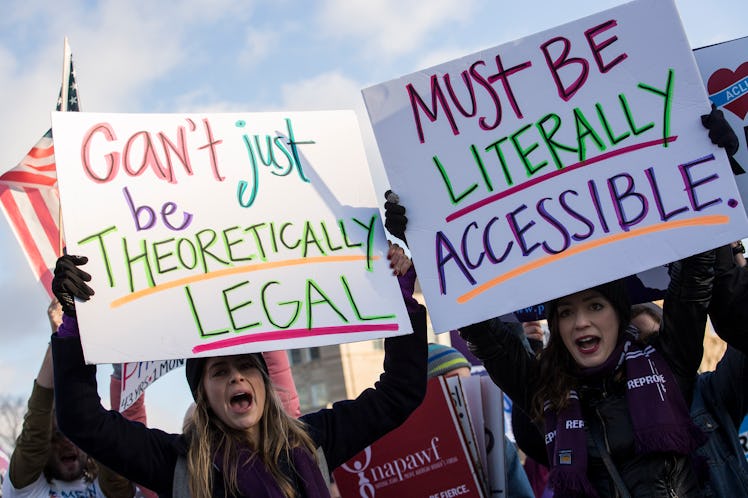
Think 2017 Was Bad For Reproductive Rights? Here’s What To Watch Out For In 2018
For reproductive rights advocates, 2017 was a challenging year, to say the least. Under the Trump administration, advocates saw attacks on access to contraceptives and abortion, and a federal government populated by anti-choice advocates. The year has, quite frankly, been a mess — though also not without its victories. So Elite Daily asked a few experts about about what 2018 might have in store for reproductive rights.
The big takeaway? Expect more of the same attacks on women’s health, especially through a concerted campaign to defund Title X — a federal grant program for family planning run by the Department of Health and Human Services's (HHS) Office of Population Affairs. This would drastically reduce access to health care, including cancer screenings and preventive care, for four million low-income women, and could be a harbinger for things to come.
“Title X is the nation’s largest federal program for birth control,” Erica Sackin, Planned Parenthood's director of political communications, says. “Four million people depend on it each year for really basic health care.” Care like contraceptives, cancer screenings, STI testing, and more.
The 2018 predictions follow a year that was bad enough on its own. There was the birth control mandate rollback in the name of religious and moral freedom, and the extension of the global gag rule, which withholds American aid funds from organizations that discuss abortion. Then there were the Office of Refugee Resettlement's continued attempts to prevent underaged, undocumented immigrants in U.S. custody from obtaining abortions. And that's to say nothing of the overwhelmingly male administration that is chock-a-block full of anti-choice advocates — including anti-contraceptives advocate Teresa Manning, who now runs Title X.
"There is an emphasis on allowing discrimination [against women] under the guise of moral and religious beliefs," Amy Friedrich-Karnik, the Center for Reproductive Rights's federal policy adviser, says.
But if you thought 2017 was bad, brace yourselves for 2018.
Birth control access will likely be targeted again.
Sackin and Friedrich-Karnik confirm that both Planned Parenthood and the Center for Reproductive Rights are preparing for the Trump administration to announce new funding plans for Title X “literally any day” now, according to Friedrich-Karnik.
The Trump administration is reportedly planning on gutting access to birth control by changing the rules of the essential grant program. In October, Crooked Media obtained a leaked White House policy wish list from the Domestic Policy Council, which contained an extensive list of the Trump administration’s future policy goals. One goal? To “halve federal funding for Title X... and divert the money into programs to promote ‘fertility awareness’ methods of birth control.” The White House declined to comment on the memo to Crooked Media at the time, and did not immediately respond to Elite Daily's request for comment.
In an emailed statement, an HHS spokesperson said that the department "[does] not provide details" on funding for Title X grants, beyond a Nov. 2017 general forecast.
An attack on Title X could happen in one of several ways.
Because Title X is a grant program, the administration will very likely go after birth control access by changing funding requirements and, by extension, which organizations can access Title X funds. The Trump administration could also go after Planned Parenthood by excluding them from funding. That would be a huge blow to the program, as 41 percent of people who receive care through Title X use Planned Parenthood, according to Sackin.
Another likely scenario? “They could structure the request to give preference to certain types of providers,” such as “fertility awareness” programs, Friedrich-Karnik says. "Fertility awareness" is also known as the rhythm method or natural family planning, which requires careful planning and a supportive partner. Its failure rate is somewhere in the 15-25 percent range, according to Planned Parenthood and the Association of Reproductive Health Professionals.
So, what do we do now?
Take heart — and a deep breath — because we have good and bad to look forward to.
While two judges have already ruled against the Trump administration’s rollback of the birth control mandate, according to The Hill, Sackin and Friedrich-Karnik both say that the fight is not over.
“The Trump administration is not backing down,” Friedrich-Karnik says.
Politics in 2017 tested our limits in many ways, but one thing both Sackin and Friedich-Karnik want to stress is that power still lies with the people. They say that while the administration tried its best to attack women's rights, this year also gave way to a groundbreaking grassroots movement.
"Pay attention to what's going on, and make your voice heard," Friedrich-Karnik advises.
One simple way to do this, according to Sackin, is to sign up to be a Planned Parenthood Defender. You'll receive notices of local, state, and national actions, who and how to call, and more.
"We have an impact," Sackin says. "Just look at how powerful all of us are when we join our voices together."